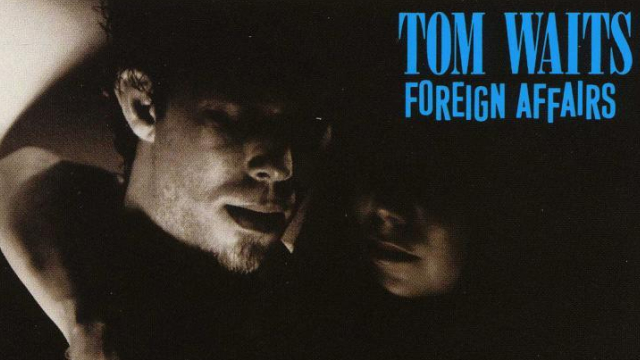Foreign Affairs – which I keep inexplicably wanting to call Foreign Exchange, so apologise if that happens here – falls into that category of “a lesser record for Tom Waits is another artist’s greatest achievement.” As a whole album, it truly is the filmic experience it wants to convey, from the Gershwin arrangements to the film noir style cover. You could take Good Kid M.A.A.D City’s declaration “A Short Film by Kendrick Lamar,” change the name to Tom Waits for Foreign Affairsand there would be similar vein of truth to it. I could imagine its cinematic sensibilities very much to people here (on what is predominately a movie site, after all), and whilst this record does have the same Nighthawk at the Diner feel about the importance of the overall experience, the less epic scope (9 songs) makes weaker songs stand out a little more.
Foreign Affairs’s dedication to both following a cinematic tone can be felt from the opening notes of the Gershwin sounding “Cindy’s Waltz.” The first instrumental since Closing Time’s titular track, this short piece has a fantastic arrangement that moves from Eastern sounding strings to an amazing trumpet finale. We then move on to “Muriel,” and as both its introductory songs being named after women will tells us, Foreign Affair is Broken Hearts more than Bad Livers. There is both great work going on from regular Waits’ bass player Jim Hughart and Frank Viraci’s saxophone playing, but the highlight of thing song for me is Waits’ lyrics, so full of euphemism you know that, whether the reason for Muriel leaving being divorce or death, that the narrator is hiding something.
The next track on the album is one of the album’s two standouts, and also Tom Wait’s first duet. It’s weird of someone my generation that star of Beaches and singer of “Wind Beneath my Wings” was once The Divine Miss M, feisty jazz singer, but here she more than makes that smart, sassy impression known here. As opposed to studying contrasts between songs we can just present them here, With Midler’s lower, more nasal register both complementing and clashing with Waits’ throat growls. The chemistry between them is fantastic, sharing and completing each other’s lines and put downs from Midler that one could see as some form of character assassination against the lovable scoundrel Waits feared he may be conveying.
“Jack and Neal” is as vulgar and entertaining as the best of the beatnik poetry it is inspired (named after two of its biggest names) without any of the pretentiousness that it could be at its worst. It contains a great, care-free-fuck-you attitude with lines like Florence Nightingale sticking “her fat ass half way out of the window with a Wilson Pickett tune/ and shouted get a load of this and gave the finger to the moon,” with is punctuated by high, repetitive bass notes and a great, almost anarchic trumpet (though not approaching free jazz territory). But on the crash of a cymbal we move to something much more calming, “A Sight For Sore Eyes,” a First Noel/Frosty the Snowman sounding number that more than helps to establishing the setting. Though for some reason, unlike Tom Traubert Blues, I do find this more distracting then establishing a context, though the intention of the song is certainly not reaching for that kind of epic.
Fortunately we then do move to this album’s epic, and a song worthy to be on any Tom Waits playlist as among the best songs he wrote: The capital C Cinematic “Potter’s Field.” One of his best spoken word pieces, this comes with clarinet, a whole variety of stringed accompaniment, cymbals and horns and, most crucially, Tom’s dramatic readings of far too many descriptors to list. It’s like a song from West Side Story if it was written by Burroughs. We then have the quest Burma-Shave, another great song that begins as a gentle piano ballad that is inspired by the name of a body product – Smell like Beat Spirits – that is used as a metaphor for a utopia society, the kind of dreams that capitalism inspires to. Also, that trumpet at the end is badass.
The final two tracks make this album have a surprisingly low key finale. “Barber Shop” is a fun piece with strange percussion and a nice bass, and definitely makes sense in the context of “Burma Shave” that just came before it, but I guess it is kind of a bit innocuous. And the title track is a beautiful little jazz ballad about equating travelling to locations with finding mates and partners, and in terms of instrumentation with strings and what sounds like some kind of instrument that ends with an –onica; not the kind of ending I normally associate with the movies that helped inspire the album. But that gives its own unique quality, as does Waits’ surprisingly subtle, at least as Waits’ voice can be, one where the more melancholic and sad emotions shows themselves through someone that’s supressed.
Foreign Affairshas some stand out tracks that still make it a must listen, particularly “I Never Talk to Strangers,” “Potter’s Field” and “Burma Shave”. And a cinephile I more than appreciate the instrumentation and style the unified record goes for. I guess it is ultimately an album I respect and like more than I love (a reservation I surprisingly don’t have for Waits’ later experimental records). But with the subtle characters on Foreign Affair I would like to see Tom Waits tackle a screenplay. Now, onto an album that inspired a couple of them.
What did you think of the album, though?
Tom Waits’ Album Ranking
- Small Change
- The Heart of Saturday Night
- Nighthawks at the Diner
- Closing Time
- Foreign Affairs

